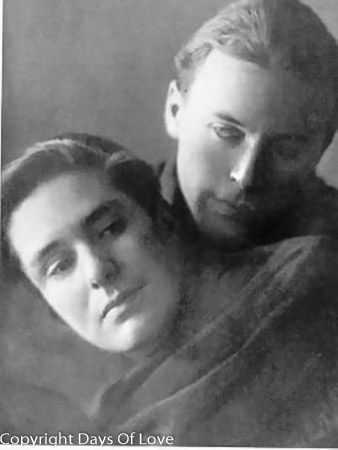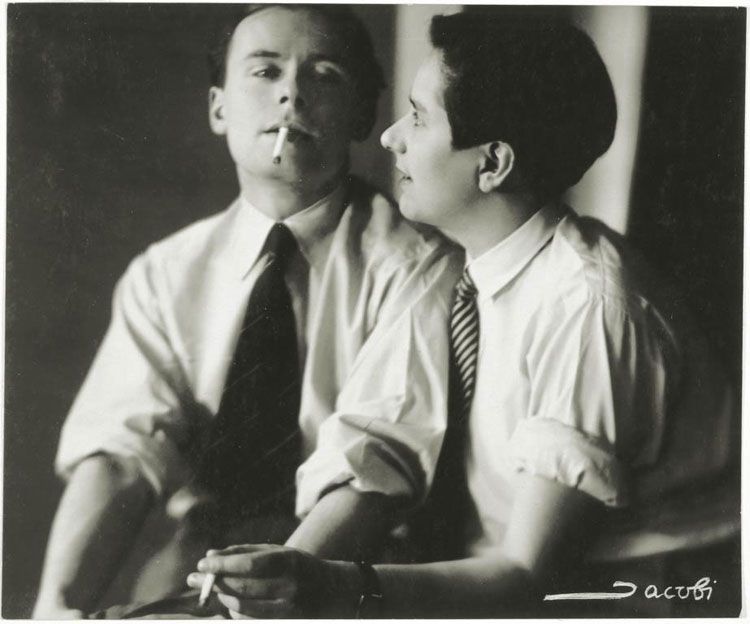

Partner Thomas Quinn Curtiss
Queer Places:
Cimetière du Grand Jas de Cannes, 2 Allée du Cimetière, 06400 Cannes, Francia
 Klaus
Heinrich Thomas Mann (18 November 1906 – 21 May 1949) was a German writer.
Klaus
Heinrich Thomas Mann (18 November 1906 – 21 May 1949) was a German writer.
Born in Munich, Klaus Mann was the son of German writer Thomas Mann and his wife, Katia Pringsheim. His father was baptized as a Lutheran, while his mother was from a family of secular Jews. He began writing short stories in 1924 and the following year became drama critic for a Berlin newspaper. His first literary works were published in 1925.
Mann's early life was troubled. His homosexuality often made him the target of bigotry, and he had a difficult relationship with his father. After only a short time in various schools,[1] he travelled with his sister Erika Mann, a year older than himself, around the world, visiting the US in 1927, and reporting about it in essays published as a collaborative travelogue in 1929.[2]
In 1924 he had become engaged to his childhood friend Pamela Wedekind, the eldest daughter of the playwright Frank Wedekind, who was also a close friend of his sister Erika. The engagement was broken off in January 1928.
Back in Paris again in the spring of 1926, Klaus Mann met René Crevel, a committed internationalist for perverse reasons: "He spent his days with Americans, Germans, Russians, and Chinese, because his mother suspected all foreigners to be crooks or perverts". Sitting on Mann’s bed, Crevel read out the early chapters of his novel La Mort difficile, with their "venomous" portrait of his mother. On this trip, Mann also met Jean Cocteau ("The hours spent in his company assume in my recollection a savour both of burlesque show and magic ritual"), Eugene McCown, Pavel Tchelitchew, Julien Green, Jean Giraudoux and others. In the same year, 1926, Klaus’s father Thomas Mann was surprised to find that the whores on the streets of Paris were predominantly male; and he observed striking new evidence of homosexual internationalism on the same streets.

Klaus and Erika Mann by Lotte Jacobi
He travelled with Erika to North Africa in 1929. Around this time they made the acquaintance of Annemarie Schwarzenbach, a Swiss writer and photographer, who remained close to them for the next few years. Klaus made several trips abroad with Annemarie, the final one to a writers' congress in Moscow in 1934.[3]
In 1932 Klaus wrote the first part of his autobiography, which was well received until Hitler came to power.[4] In 1933 Klaus participated with Erika in a political cabaret, the Pepper-Mill, which came to the attention of the Nazi regime. To escape prosecution he left Germany in March 1933 for Paris, later visiting Amsterdam and Switzerland, where his family had a house.
In November 1934 Klaus was stripped of German citizenship by the Nazi regime. He became a Czechoslovak citizen. In 1936, he moved to the United States, living in Princeton, New Jersey, and New York. In the summer of 1937, he met his partner Thomas Quinn Curtiss, who was later a longtime film and theater reviewer for Variety and the International Herald Tribune. Mann became a US citizen in 1943.
During World War II, he served as a Staff Sergeant of the 5th US Army in Italy and in summer 1945 he was sent by the Stars and Stripes to report from Postwar-Germany.
Mann's most famous novel, Mephisto, was written in 1936 and first published in Amsterdam. The novel is a thinly-disguised portrait of his former brother-in-law, the actor Gustaf Gründgens. The literary scandal surrounding it made Mann posthumously famous in West Germany, as Gründgens' adopted son brought a legal case to have the novel banned after its first publication in West Germany in the early 1960s. After seven years of legal hearings, the West German Supreme Court banned it by a vote of three to three, although it continued to be available in East Germany and abroad. The ban was lifted and the novel published in West Germany in 1981.
Mann's novel Der Vulkan is one of the 20th century's most famous novels about German exiles during World War II.
He died in Cannes of an overdose of sleeping pills on 21 May 1949,[5] though whether he committed suicide is uncertain. He was buried there in the Cimetière du Grand Jas.
My published books: